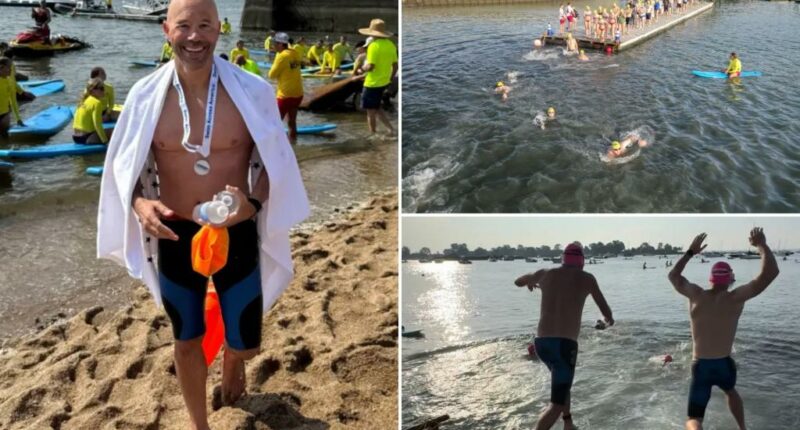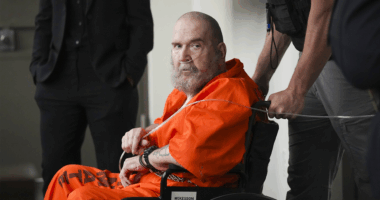Share this @internewscast.com

The Long Island Sound stretches a whopping 110 miles, from New York City’s East River to well past the tip of Long Island.
On Saturday, Aaron Kwittken, aged 54, undertook an impressive swim of over six miles (approximately 10 kilometers) to raise funds for cancer research. Remarkably, this event marked the sixth time he has completed such a challenging feat.
The event is part of Swim Across America, a nonprofit that supports cutting-edge cancer treatment through community-driven endurance events.
Kwittken, who has survived cancer twice, shared the strategies he employs to endure the demanding swim. These include his inspiring mantra and the clever location where he stores honey for its various benefits.
There are several personal reasons behind Kwittken’s swims: to honor his late mother, a Holocaust survivor who passed away last year; to support his sister, a breast cancer survivor; and as a testament to his own journey as a cancer survivor.
“Unfortunately, it is one of those diseases where you either know someone who’s battled it or you’ve lost someone to it,” he told The Post.
At 29, the Greenwich, Connecticut resident was diagnosed with melanoma — the deadliest form of skin cancer — after spotting what looked like a speck of pencil lead on his hand.
“I’m very lucky that we caught it very early, otherwise I would have potentially lost my hand — maybe even my life,” he said.
He later had basal cell carcinoma — or, as he calls it, “baby cancer” — as well. Since then, Kwittken’s been religious about skin checks and preventative treatment.
Every year, he undergoes a face-peeling procedure called photodynamic therapy that targets pre-cancerous cells — and leaves him looking like “a cherry” for days.
But swimming has been a form of salvation as well — one that began when he was a 10-year-old with asthma.
“My allergist told me, ‘The best thing you can do is to expand your lungs, and the best way to do that is to swim.’ So swimming to me has a huge emotional connection,” he said.
“I feel like there’s this weird, kind of cosmic connection. Swimming brings you a lot closer to nature and it’s very spiritual.”
Aaron Kwittken
To this day, swimming holds for him a unique, spiritual quality.
“Open water is amazing because it’s very rhythmic and super meditative,” he said. “There’s literally a flow to swimming in open water. You feel the current: sometimes you’re with it, sometimes you’re against it.”
Just recently, he was in the water, marveling at how different each hour can be and what that means.
“The first hour was very calm, almost flat, and the second was super choppy — and that’s kind of like life, right?” he said. “It’s very dynamic, it’s moving — you kind of prepare yourself for anything that’s going to come your way.“
It’s also where he finds his mind gravitating towards his loved ones, even when he’s just trying to clear his head.
“I honestly think mostly about my friends and my family and people I’ve lost when I swim. That doesn’t happen when I’m running or when I’m biking or even in yoga — only in swimming,” he said.
“I feel like there’s this weird kind of cosmic connection. Swimming brings you a lot closer to nature and it’s very spiritual.”
Naturally, a 10K swim like Saturday’s is a slightly less… tranquil experience.
If the water is choppy, you need more of a bent-elbow stroke to cut through waves and you have to breathe into your armpit, which strains the neck.
“People don’t realize it, but swimming in a pool is a piece of cake,” he said with a laugh. “But, my god, open water — but that’s what’s so exciting about it because it’s just the unknown.”
Pro tip? Snag some honey.
“Honey helps coat your tongue because the saltwater just destroys your mouth and tongue — plus it’s antibacterial and gives you energy since it’s sugar,” he said.
Like other types of endurance training, preparing for a long-distance swim requires a gradual build-up as you acclimate to longer distances.
Preparing for a major athletic event is also mental — and Kwittken has a well-worn trick on that front: “When you’re doing endurance training, mantras are everything,” he said.
When he completed his first Ironman, his friend gave him a phrase that means “Never give up” in Hawaiian, which he wrote on his wrist with a Sharpie.
He now has a tattoo on his wrist — Hineni — which translates to “Here I am.”
“It’s a reminder to always stay present, because this is a gift. Whatever you have the ability to do, we shouldn’t take it for granted,” he said.
But his personal favorite mantra? Never “DNF.” It’s a racing term that stands for “Did not finish,” meaning a participant didn’t complete the race.
“If I have a DNF, it means I’m dead,” he said.
“I’ve never not finished something, so ‘Never DNF’ is my mantra, and it goes for life, whether I’m starting a company or building a piece of technology or serving your community doing something hard. Hard things are great — they make you better.”
















